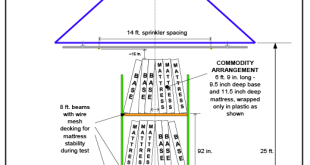
HELP AFSA HELP YOU
SPRINKLER FITTER APPRENTICESHIP PROGRAMS
We all know the weakest link in the chain of success for this industry is a lack of qualified and trained people. In fact, I recently had a member tell me that they have such a hard time finding people to hire, they now encourage long-haired, freaky people to apply. Yes, there are members who could grow at a faster pace with better funding or working capital, but, at its core, the Achilles heel for most AFSA members continues to be qualified field labor and well-trained layout technicians. I’m sure many of you are tired of hearing (or reading) me beat this drum. What many of you may not know is that I am a drummer, and as such, you get the picture.
AFSA has expanded many training programs, especially for sprinkler fitting apprentices, with our Virtual Instruction Program (VIP). This program is designed to allow employers to focus on the OJT (field training) part while AFSA delivers the classroom portion in the hope of creating better pathways for success in terms of training and retention to benefit the employers and employees. (AFSA is always looking for additional qualified trainers.)
Our fitter apprenticeship program has always experienced some drop-off candidates, especially following book one, based on some deciding being a fitter isn’t a good fit for them (pun intended) or perhaps better opportunities came along. Regardless, with good hiring practices up front followed by a sincere interest shown by employers who encourage and reward progress and retention, we should see better results in this area… we are not. So where are the problems, and what are the solutions?
Let’s start with the concerns I’ve shared many times related to hunters and gatherers versus farmers as it applies to developing people for our industry. Some companies invest in training programs for long-term gains (farmers), while others often pick off the fruits of their labor before that fruit has had time to ripen (hunters and gatherers). In plain English, those companies with short-term vision hire (poach), undertrain people, and offer higher-than-deserved pay rates to solve their short-term, immediate need to get a job done. I think we all understand why this happens, but in the bigger picture, that practice is hurting our industry, and I urge those who practice this to reconsider the sustainability of it.
Under-trained and overpaid workers are increasing your liability and holding your entire company back in terms of long-range growth and profitability. Investing in training people for long-term productivity and sustained knowledge will help you drive success. In addition, ask yourself, as leaders, managers, or business owners, where you came from. How did you start in this industry, and what were the building blocks to your success? We all know fire sprinkler company owners who started as fitters or designers/technicians. Who trained, mentored, and invested in you?
Let’s consider the fact that many companies do not take advantage of formal training programs like AFSA’s sprinkler fitter apprentice programs, inspector training and development, or our design schools. In fact, there are a lot of open shop fire sprinkler contractors across the United States who don’t belong to AFSA, NFPA, or any trade association. Let’s set that group aside for now and focus the conversation on the people I care about the most… our AFSA members. How can we help make our members stronger and better in the long term?
I believe having a formal apprenticeship program for the sprinkler fitting trade is critical to success, especially for merit shop contractors. There is a lot more to installing a fire sprinkler system than just twisting pipe or using an impact driver to make up the bolts on grooved couplings. There is a reason apprentices and certification programs are subjected to 6,000 plus OJT manhours, and balancing hourly labor costs to install systems is not among them. It takes time to learn any trade and to be exposed to enough circumstances and experiences to develop the skills necessary to be called a journeyman or journeywoman.
We are in a constant battle with organized labor and with our own federal government to be considered as equals for government contract awards and accredited programs. When we choose to opt out of real training programs approved by the Department of Labor (DOL), we open ourselves up to the criticisms leveled by groups who would like to see us outlawed, banned, and banished from major projects and government-funded work—projects funded by your tax dollars. To expedite the DOL registration process for our members, AFSA has registered our sprinkler fitting curriculum as National Guideline Standards (NGS) with the DOL. This essentially gets your apprenticeship program halfway to the DOL-registered finish line. You, as the employer, can work with your local DOL representative to fill in the blanks (on items like wages, reporting, hiring, etc.) to take your application the rest of the way resulting in a federally registered apprenticeship program.
Like any program, our new VIP classroom training has had a few people fall behind in their expected progress, including exams. The program anticipated this and provided a contingency by extending opportunities by up to two months for apprentices who need a little extra time to complete each phase of training. However, even with a built-in extension opportunity, we still have a few enrolled apprentices who drop out or, worse, end the formal training but stay on working in the field without proper training.
The solution must start with the employer. Encouraging registered apprentices to stay on course while providing rewards for milestone successes as well as penalties for falling behind or dropping out is the best and simplest pathway to success. These practices will also encourage others to want to get into formal apprenticeship programs. We want to encourage our contractor members to exercise good hiring practices to ensure higher success rates, but we all need to invest in best-in-class training for the strength and longevity of our industry and the merit shop movement.
We are in this together! Your AFSA is here to deliver robust training programs for your company’s benefit and long-term health. We need your help to ensure these programs are delivered at the level where they matter most, with your people at the local level. We rely on employers, leaders, and managers to keep your people engaged and on track in enrolled training programs because we here at AFSA do not have any control over them to ensure they stay on track. We are in this together, but we cannot do it alone. Help us help you by taking an active role in ensuring your investment in the people you enroll in AFSA training programs meets their intended outcomes so you, they, and we all enjoy the results and successes we expect.
ABOUT THE AUTHOR:

Bob Caputo, president of AFSA, is chair of the NFPA 24 and NFPA 291 Technical Committees and a member of multiple NFPA technical committees, including NFPA 13 and NFPA 25. Caputo is a contributor of the NFPA 13 and NFPA 25 Handbooks, the Fire Protection Handbook 21st edition, and the NFPA Inspection Manual. He has written and presented seminars throughout the world on fire protection and life safety systems, project and field labor management, and is a regular speaker at AFSA and NFPA conventions.
Caputo is an instructor at the National Fire Academy and a member of the Industry Advisory Board at OSU School of Fire Protection Engineering & Safety. His industry distinctions include “Fire Prevention Officer of the Year ‘’ from San Diego County in 1994; “Man of the Year” from Fire Protection Contractor magazine in 1997; and the Henry S. Parmelee award from AFSA in 2017. Caputo attended the University of Albuquerque, New Mexico and is a U.S. Navy veteran and former volunteer firefighter.

 Sprinkler Age A Publication of the American Fire Sprinkler Association
Sprinkler Age A Publication of the American Fire Sprinkler Association



